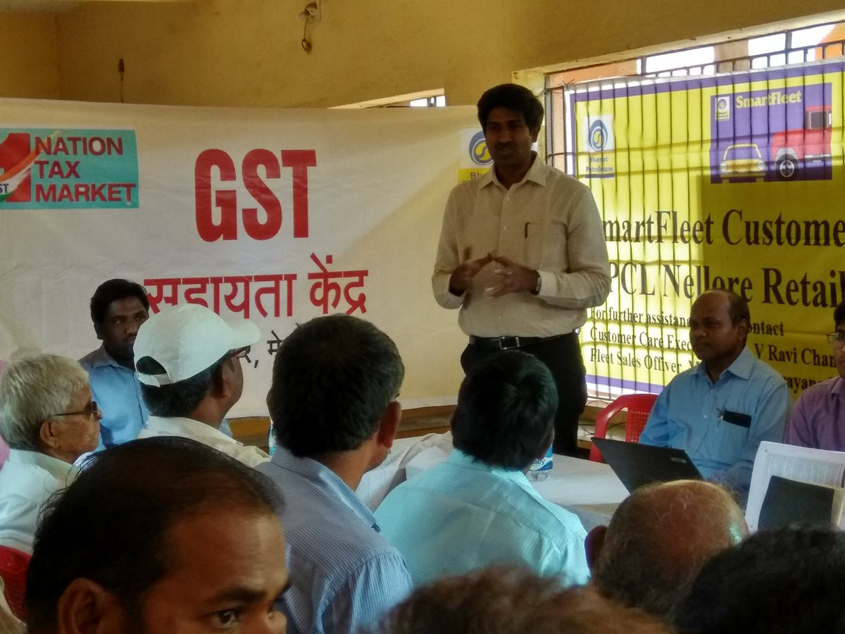Many government and industry bodies have initiated efforts to help the trader community smoothly adopt the new Goods and Services Tax (GST) regime by organising workshops and setting up helpdesks.
The Prime Minister Narendra Modi-led BJP government on Saturday launched the much awaited tax reform, which aims to manage around 320 crore invoices every month. After the constitutional amendment for introduction of GST, Central Board of Excise and Customs (CBEC) launched a 24×7 help desk with toll-free number 1800-1200-232 and email: cbecmitra.helpdesk@icegate.gov.in for assisting central excise/service tax assessees. A step-by-step taxpayers’ user guide for migration was also made available at www.aces.gov.in and www.cbec.gov.in
“Model GST Law and Rules, a series of guidelines, have been put into the public domain for seeking inputs and comments from taxpayers as well as other stakeholders to avoid any subsequent hardships and litigations. Furthermore, 18 sectoral groups have been created to address sector-specific queries. A war room has been created at CBEC to enable them to address the concerns of the trade and industry,” a CBEC spokesperson told The Sunday Guardian.
Several industry associations like ASSOCHAM, Confederation of All India Traders (CAIT), Institute of Chartered Accountants of India (ICAI) and Retailers Association of India (RAI), among others, have launched helpdesks and sector-specific workshops. These helpdesks are empanelled with experts to educate traders on the technical issues and other intricacies of filing taxes under the new regime.
CAIT, in collaboration with HDFC bank and Tally Solutions Limited, has organised a national campaign, Digital Rath, across five cities to empower traders and small merchants in adopting digital payments and sensitising them towards GST compliance. The trader body has also released a “GST white paper” to disseminate information about the new indirect tax regime.
“The GST paper is designed to educate traders in the most comprehensible manner. Furthermore, under ‘Digital rath’, we are going shop to shop, and imparting knowledge on GST compliance,” said CAIT Secretary General Praveen Khandelwal.
Retailers Association of India has also set up a helpdesk at the national level for its members, which is addressing more than 100 queries a day through various channels like WhatsApp, telephone, mailers and tweets.
“In the last few days the majority of the queries received have been on GST rates/slabs, Harmonized System of Nomenclature (HSN) Codes and B2C (business to consumer) invoice format and requirements. We have various subject matter experts empanelled with us to address the queries,” RAI told The Sunday Guardian.
Many private firms have also come forward to provide technical solutions to aid an easy transition into the GST regime.
Paytm Mall recently launched a “comprehensive seller assistance programme” in addition to its offline camps and online workshops to facilitate smooth GST compliance of the merchants in its platform.
“We have developed an intuitive seller services platform to facilitate tax-compliance. Additionally, we have also launched a dedicated GST helpdesk for direct communication with the merchants,” said Amit Sinha, COO-Paytm Mall.
HP India, in collaboration with KPMG, has also launched an affordable invoicing platform, GST Solution, to help the transition of millions of traders and Micro, Small & Medium Enterprises (MSMEs) into the GST regime.
“To ensure affordability for the users, GST solution will be available at an EMI option starting at Rs 1,650 per month for 24 months with no downpayment for pre-approved credit cards. The starting price of the solution will be Rs 33,990,” Sumeer Chandra, MD, HP Inc. India told The Sunday Guardian.
Talking about the challenges ahead, industry experts said that while the helpdesks and sector-specific workshops have instilled confidence among traders, their role will become vital during the initial few months of the implementation as the new tax regime is tech-heavy and many traders are not well trained in technology.
“GST will usher in a complete structural change and the initial few months will see hiccups. There will be new challenges and new questions and they will have to be duly addressed. It is after the stabilisation that we’ll start seeing the benefits of the new tax reform,” said Nihal Kothari, Chairman of the National Council of Indirect Taxes, ASSOCHAM.

